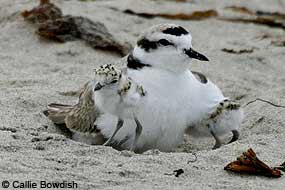|
You are viewing ARCHIVED content published online before January 20, 2025.
Please note that this content is NOT UPDATED, and links may not work. For current information,
visit https://www.nps.gov/aboutus/news/index.htm.
Contact: John Dell'Osso, 415-464-5135

The federally-threatened western snowy plover nesting season is underway. Nesting inconspicuously between the tidal zone and upper reaches of coastal beaches, snowy plovers on the West Coast are faced with habitat loss, disturbance, and predation, all of which have taken a toll on this species. Point Reyes National Seashore, one of the few remaining nesting grounds for this rare bird, typically supports 15 to 20 adult breeding plovers. In partnership with the Point Reyes National Seashore Association and Point Blue Conservation Science (formerly PRBO Conservation Science), the snowy plover population has been monitored annually since 1995. To assure success occurs this nesting season, the temporary closure from Friday, July 4, through Sunday, July 6, of a small stretch of the Point Reyes Beach will be enforced. The closure will be established between 0.5 miles north of the North Beach parking lot and 0.35 miles south of the mouth of Abbotts Lagoon. (Map - 292 KB PDF) Closing a portion of the Great Beach to public access is important to minimize disturbance to nests, chicks, and breeding adults during this critical time. The closure over the busy holiday weekend will help chicks stay warm, have enough food, and stay hidden from predators. In 2013, of the 11 newly hatched chicks in this area, only 3 survived past the July 4 weekend. "Following a significant low point in 2012, plover breeding success was stronger in 2013 but not nearly where we would like to see it," stated park biologist David Press. "The plovers face an uphill battle and a productive 2014 season is essential to their persistence on Point Reyes beaches." Superintendent Cicely Muldoon added, "We have seen a growing understanding by the community and visitors of how important it is to protect plovers with some beach restrictions." She added, "We appreciate everyone's support for these temporary closures." In addition to the July 4 weekend closure, the portion of the Great Beach from the intersection of Kehoe Beach trail and Kehoe Beach to the North Beach parking lot (as signed) is closed annually to dogs from March 1 through September 30. As alternatives for park visitors with dogs, other popular beaches such as east Limantour Beach (to the left as you approach the beach) and Kehoe Beach remain open. All dogs in the park are required to be on a leash no longer than six feet. Check in at any visitor center for current information. Further efforts to protect the plovers include roping off breeding habitat on upper sections of beaches and the construction of "exclosures" around their nests immediately after an egg is laid. Plover exclosures are erected at the nest site and made of wire fencing. Plovers have easy access in and out of the wire mesh, but the eggs are protected from disturbance and predators. Habitat restoration efforts will continue throughout the season with hand pulling of invasive European beachgrass (Ammophila arenaria) and monitoring native dune plants. The bulk of the restoration was done in 2011 using mechanical removal to restore 250 acres of plover and rare plant habitat near Abbotts Lagoon. Plovers have moved into the restoration area, with nine nests established there this year, six of which have hatched. By contrast, in the past three years, only three nests have occurred, but none have hatched. For more information on snowy plovers, please visit our Snowy Plovers at Point Reyes page. -NPS- |
Last updated: September 2, 2022
